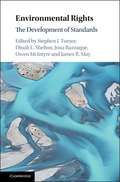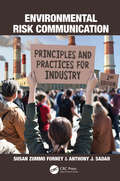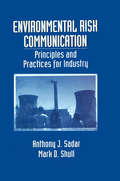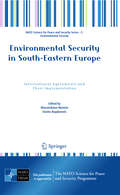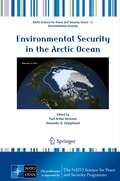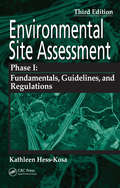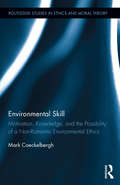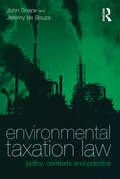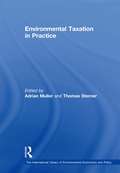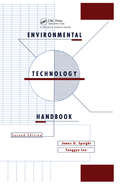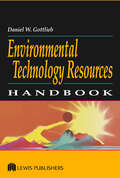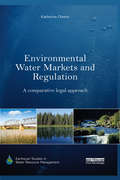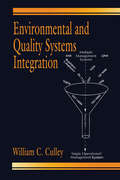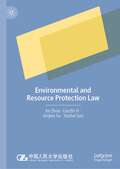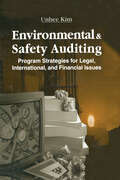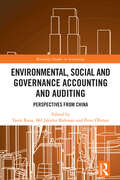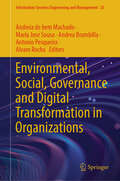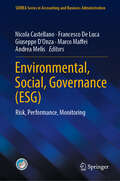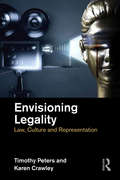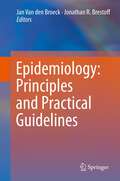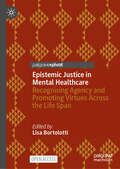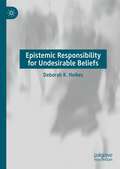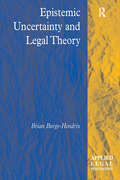- Table View
- List View
Environmental Rights: The Development of Standards (Routledge Explorations in Environmental Studies)
by James R. May Jona Razzaque Owen McIntyre Stephen J. Turner Dinah L. SheltonEnvironmental rights, also known as the human rights or constitutional rights that are used for the protection of the environment, have proliferated over the last forty-five years. However, the precise levels of protection that they represent has since been a major question associated with this phenomenon. Environmental Rights: The Development of Standards systematically investigates this question by analyzing the emerging standards of environmental protection that are associated with such rights and the way that those associations are becoming formalized. It covers all of the relevant human rights treaties to illustrate how environmental rights standards are emerging in this dynamic area. Bringing together an elite group of scholars, this book discusses significant new insights into the way that environmental rights are developing, the standards of protection that they confer, and the way that standards in the field of environmental rights can potentially be further developed in the future.
Environmental Risk Communication: Principles and Practices for Industry
by Susan Zummo Forney Anthony J. SadarModern industry faces many communication challenges, including social media. The second edition of this book is thoroughly updated, expanded, and reorganized to help industry communicators remain effective in addressing these challenges. At the core of this book are foundational building blocks that address the human factors responsible for driving success or failure when communicating about environmental risk. Features Provides principled guidance for building relationships and engaging in constructive dialogue with stakeholders. Offers straight talk and practical, easy-to-follow guidance on effective risk communication for various situations, stakeholders, and modes of communication. Gives lessons learned from environmental permitting and crisis situations involving risk communication in various industries, including chemical manufacturing, waste management, and the energy sector. Addresses nuanced, recent concerns regarding issues like fake news and social media bullying. Examines the dos and don’ts of communicating effectively during tough conditions like environmental emergencies. Environmental Risk Communication: Principles and Practices for Industry is intended to be both a grounding in enduring principles and a continued resource for best approaches and techniques. Coupled with tools and best practices from decades of experience, this insider’s guide provides CEOs, plant managers, environmental compliance professionals, health and safety officers, and others with the direction and the confidence needed to prepare for difficult dialogue and high-pressure encounters.
Environmental Risk Communication: Principles and Practices for Industry
by Anthony Sadar Mark ShullA public meeting with angry residents and eager reporters is a common feature on the local news. Whether addressing environmental, or other issues, the experience for the board members, consultants, and specialists at these meetings ranges from uncomfortable to nightmarish. The issues discussed in these meetings usually stem from years of community disappointment, mistrust, fears, factions, political or social positioning, or all of the above. Industry faces a labyrinth of environmental and business regulations, and unique challenges in dealing with the public and the media. Environmental Risk Communication serves as a guide to understanding and complying with the Federal Risk Management Program and applying risk management and communication principles to daily plant operations. This book also helps Risk Management Plan (RMP) facilities successfully meet the new Federal requirements for public disclosure of RMP offsite consequence analysis results and provides techniques for communicating effectively during environmental emergencies.Written in a straight-forward, no-nonsense style the book presents concise informative chapters, flow diagrams, checklists, and a thorough index. The authors present step-by-step instruction on developing a principled plan of action that generates open communications. CEOs, Corporate Communications Specialists, Plant Managers, Environmental Compliance Supervisors, Health and Safety Officers, Environmental Scientists and Engineers, and Consultants will benefit from Environmental Risk Communication.
Environmental Security in South-Eastern Europe
by Massimiliano Montini Slavko BogdanovicAuthored by international experts from academia, international organizations, governments and NGOs, this book highlights the main environmental security issues in the South-East European (SEE) countries, with a particular focus on climate change and water management. The common goal of the authors was to provide a reliable evaluation of whether existing legal regimes and correct implementation of applicable international treaties may contribute to reducing environmental security risks in the region. In-depth analyses and assessment of major challenges in compliance, serve as a firm ground which such evaluation is based on. This volume is recommended for public officials, legal practitioners and consultants. Its interest may also extend beyond the SEE countries, serving as a case-study of a broader and paradigmatic relevance of the analysis and management of environmental and security issues in a trans-boundary context.
Environmental Security in the Arctic Ocean
by Paul Arthur Berkman Alexander N. VylegzhaninThis seminal book results from a NATO Advanced Research Workshop at the University of Cambridge with Russian co-directorship, enabling the first formal dialogue between NATO and Russia about security issues in the Arctic Ocean. Involving interdisciplinary participation with experts from 17 nations, including all of the Arctic states, this workshop itself reflects progress in Arctic cooperation and collaboration. Interests now are awakening globally to take advantage of extensive energy, shipping, fishing and tourism opportunities in the Arctic Ocean as it is being transformed from a permanent sea-ice cap to a seasonally ice-free sea. This environmental state-change is introducing inherent risks of political, economic and cultural instabilities that are centralized among the Arctic states and indigenous peoples with repercussions globally. Responding with urgency, environmental security is presented as an "integrated approach for assessing and responding to the risks as well as the opportunities generated by an environmental state-change." In this book - diverse perspectives on environmental security in the Arctic Ocean are shared in chapters from high-level diplomats, parliamentarians and government officials of Arctic and non-Arctic states; leaders of Arctic indigenous peoples organizations; international law advisors from Arctic states as well as the United Nations; directors of inter-governmental organizations and non-governmental organizations; managers of multi-national corporations; political scientists, historians and economists; along with Earth system scientists and oceanographers. Building on the "common arctic issues" of "sustainable development and environmental protection" established by the Arctic Council - environmental security offers an holistic approach to assess opportunities and risks as well as develop infrastructure responses with law of the sea as the key "international legal framework" to "promote the peaceful uses" of the Arctic Ocean. With vision for future generations, environmental security is a path to balance national interests and common interests in the Arctic Ocean for the lasting benefit of all.
Environmental Site Assessment Phase I: A Basic Guide, Third Edition
by Kathleen Hess-KosaExtensively updated, this third edition provides a valuable guide to the tools and techniques used to perform Phase 1 site assessment. This book elucidates the systematic processes and methods used by leaders in the industry. It also emphasizes the development of an easy-to-follow investigative strategy for in-house assessment. After reviewing the history of the field, legal issues, and important terms, the book discusses physical setting, historic usage, property and area reconnaissance, building materials, and industrial activities associated with a property. It also gives interviewing tips, lists regulatory agencies, and considers unique situations such as wetlands and historical buildings.
Environmental Skill: Motivation, Knowledge, and the Possibility of a Non-Romantic Environmental Ethics (Routledge Studies in Ethics and Moral Theory)
by Mark CoeckelberghToday it is widely recognized that we face urgent and serious environmental problems and we know much about them, yet we do very little. What explains this lack of motivation and change? Why is it so hard to change our lives? This book addresses this question by means of a philosophical inquiry into the conditions of possibility for environmental change. It discusses how we can become more motivated to do environmental good and what kind of knowledge we need for this, and explores the relations between motivation, knowledge, and modernity. After reviewing a broad range of possible philosophical and psychological responses to environmental apathy and inertia, the author argues for moving away from a modern focus on either detached reason and control (Stoicism and Enlightenment reason) or the natural, the sentiments, and the authentic (Romanticism), both of which make possible disengaging and alienating modes of relating to our environment. Instead he develops the notion of environmental skill: a concept that bridges the gap between knowledge and action, re-interprets environmental virtue, and suggests an environmental ethics centered on experience, know-how and skillful engagement with our environment. The author then explores the implications of this ethics for our lives: it changes the way we think about , and deal with, health, food, animals, energy, climate change, politics, and technology.
Environmental Taxation Law: Policy, Contexts and Practice
by John Snape Jeremy de SouzaThe theoretical arguments for environmental taxes and other types of economic instruments for environmental protection have been discussed extensively in the literature. Rather less well discussed has been the extremely complex form that such instruments have in fact taken in practice. Environmental Taxation Law: Policy, Contexts and Practice examines the legal implications of introducing environmental taxes and other economic instruments into the regulatory framework of UK law. In doing so, it analyzes and explains the difficulties of grafting environmental taxes onto the complexities of existing regulatory structures, not all of which, of course, were originally devised with environmental considerations in mind. Although the focus of the book is the UK's pioneering implementation of a web of distinct yet interrelated policy measures, it locates the UK's taxes and instruments not simply in their broader context of market and environmental regulation, but also in the contexts of European and international law.
Environmental Taxation in Practice (The International Library of Environmental Economics and Policy)
by Thomas SternerSince the 1980's, market-based instruments for environmental policy have become increasingly important. Focusing on environmental taxation in practice, this volume collects key contributions on a wide range of topics, including comparisons of environmental taxation schemes in different countries, political economy issues and key aspects of concrete implementation. It presents a wealth of ex-ante and ex-post analyses, intended as a source of guidance for policy implementation and research. The volume features a full-length introduction locating the literature on environmental taxation in practice in a wider context of theoretical and applied issues.
Environmental Technology Handbook: 2nd Edition (Applied Energy Technology Ser.)
by James G SpeightHistorically, the development of civilization has upset much of the earth’s ecosystem leading to air, land, and water pollution. The author defines pollution as the introduction of a foreign substance into an ecosystem via air, land or water. This book delves into issues that effect the everyday lives of people who come in contact with these hazards. By examining these issues, this body of work aims to stimulate debate and offer solutions to the ever-growing threat to the environment and humanity. Includes problems with each chapter, Explores issues such as control of gaseous emissions, waste recycling and waste disposal, Explains physical and thermal methods of waste management, Provides definitions and resources for future reference, Discusses the history of environmental technology.
Environmental Technology Resources Handbook
by Daniel W. GottliebThis handbook guides the user to hundreds of technologies, practices, partnership opportunities, and funding resources. Presented in non-technical language, it covers hundreds of publicly available resources for pollution prevention, control, remediation, and assessment. Environmental Technology Resources Handbook will help you:
Environmental Water Markets and Regulation: A comparative legal approach (Earthscan Studies in Water Resource Management)
by Katherine OwensRiver systems around the world are degraded and are being used unsustainably. Meeting this challenge requires the development of flexible regimes that have the potential to meet essential consumptive needs while restoring environmental flows. This book focuses on how water trading frameworks can be repurposed for environmental water recovery and aims to conceptualise the most appropriate role for law in supporting recovery through these frameworks. The author presents a comprehensive study of the legal frameworks in four jurisdictions: the States of Oregon and Colorado in the western United States; the province of Alberta in Canada; and the Murray-Darling Basin in Australia/Basin State of New South Wales. A close comparative analysis of these four jurisdictions reveals a variety of distinctive regulatory arrangements and collaborations between public and private actors. In all cases, the law has been deployed to steer and coordinate these water governance activities. The book argues that each regime is based on a particular regulatory strategy, with different conceptions of the appropriate roles for, and relationships between, various actors and institutions. Legal frameworks do not have the capacity to rationalise and provide an overarching and absolute solution to the complex environmental and governance issues that arise in the context of environmental water transactions. Rather, the role of law in this context needs to be reconceptualised within the paradigm of regulatory capitalism as establishing and maintaining the limits within which regulatory participants can operate, innovate and collaborate.
Environmental and Quality Systems Integration
by William C. CulleyGlobal competition, corporate downsizing and corporate restructuring have forced many firms to reevaluate their operating methods. Today, corporations must do more with less while still watching the bottom line and improving profitability. ISO 14000 and ISO 9000, because of their similar management system requirements and auditing procedures, are g
Environmental and Resource Protection Law
by Ke Zhou Luozhi Yi Xinjian Su Youhai SunThis book mainly focuses on environmental and resource law under Chinese law, involving secondary disciplines such as international law, civil law, administrative law and criminal law, as well as issues related to other first-class disciplines such as environmental science and ecology. The contents include general theory of environmental law (basic theory), prevention and control of environmental pollution, natural resources protection law and international environmental law. It basically covers all fields of China's environmental law and is a handy reference for those seeking to understand it.
Environmental and Safety Auditing: Program Strategies for Legal, International, and Financial Issues
by Unhee KimThis is a complete and concise guide to creating and managing a successful environmental audit program. It provides step-by-step guidance on setting up an audit program for nearly every major component of environmental concern, from air standards to workplace safety, and from effluent discharge to waste handling and disposal.
Environmental, Social and Governance Accounting and Auditing: Perspectives from China (Routledge Studies in Accounting)
by Tarek Rana Peter Öhman Md Jahidur RahmanIn a rapidly evolving world where Environmental, Social, and Governance (ESG) considerations are at the forefront of business and investment decisions, understanding the intricate interplay between ESG factors and corporate performance is paramount. This book demystifies ESG by providing empirical insights from the unique perspective of China, shedding light on the impact of ESG on financial performance and corporate governance. It investigates the impact of environmental expertise, social variability, and board governance model on firm performance.The book sets the stage by introducing the reader to the significance of ESG in today's corporate world, examining empirical evidence gathered from a decade of data analysis on Chinese-listed companies. It explores how ESG practices influence corporate financial performance and what role audit quality plays in this equation. Drawing from a wealth of data, it provides practical insights into the effects of ESG disclosure, ownership structures, corporate governance, and more on the performance of businesses. It offers a clear understanding of the empirical realities in China while addressing a global audience interested in harnessing ESG for sustainable corporate success. It provides valuable lessons and comparisons that can benefit readers beyond China's borders.The book bridges the gap between research and practice, translating complex research findings into actionable recommendations, enhancing its appeal to both academic and professional audiences. It is a must-read for scholars, students and researchers seeking actionable insights into the world of ESG. Further, it discusses ESG practice and policy implications, offering recommendations for stakeholders including policymakers, investors, managers, and auditors.
Environmental, Social, Governance and Digital Transformation in Organizations (Information Systems Engineering and Management #35)
by Alvaro Rocha Maria Jose Sousa Andreia de bem Machado Andrea Brambilla Antonio PesqueiraThis book investigates the dynamic interaction between environmental, social and governance (ESG) programs and digital transformation, addressing important themes such as corporate governance, ethical leadership, stakeholder engagement and sustainability in a digital age. Exploring a range of sectors, it examines the impact of AI on governance, child protection and smart cities, along with the integration of ESG strategies in healthcare, waste management and Industry 4.0. Through case studies and analysis, he highlights challenges such as technological stress, while offering insights into sustainable business ecosystems, strategic leadership and transparency. The 22-chapter book bridges the gap between academia and the sector, presenting innovative frameworks and practical solutions to promote resilient, ethical and sustainable digital transformation.
Environmental, Social, Governance: Risk, Performance, Monitoring (SIDREA Series in Accounting and Business Administration)
by Andrea Melis Marco Maffei Francesco De Luca Nicola Castellano Giuseppe D’OnzaThis edited volume covers Environmental, Social, and Governance (ESG) topics and their impact on companies' financial performance. It is the outcome of an academic research group coordinated by the Italian Society of Professors of Business Administration and Accounting. The book discusses corporate governance, management accounting and control systems, performance measurement, auditing and risk management, and their roles in business strategy and corporate finance. It includes several case studies from Italian corporation to illustrate the theories and their implementation in practice.
Envisioning Legality: Law, Culture and Representation
by Karen Crawley Timothy PetersEnvisioning Legality: Law, Culture and Representation is a path-breaking collection of some of the world’s leading cultural legal scholars addressing issues of law, representation and the image. Law is constituted in and through the representations that hold us in their thrall, and this book focuses on the ways in which cultural legal representations not only reflect or contribute to an understanding of law, but constitute the very fabric of legality itself. As such, each of these ‘readings’ of cultural texts takes seriously the cultural as a mode of envisioning, constituting and critiquing the law. And the theoretically sophisticated approaches utilised here encompass more than simply an engagement with ‘harmless entertainment’. Rather they enact and undertake specific political and critical engagements with timely issues, such as: the redressing of past wrongs; recognising and combatting structural injustices; and orienting our political communities in relation to uncertain futures. Envisioning Legality thereby presents a cultural legal studies that provides the means for engaging in robust, sustained and in-depth encounters with the nature and role of law in a global, mediated world.
Envisioning a Better Future for Nonhuman Animals: Towards Future Animal Rights Declarations (The Palgrave Macmillan Animal Ethics Series)
by Doris SchneebergerThis book presents an ethical discussion of the possible future Universal Declarations of (diverse specific nonhuman) Animal Rights. It contributes to a basis for a discussion about (nonhuman) animal rights concerning diverse aspects and quality of (nonhuman) animal life. Doris Schneeberger deals with the interpretation and justification of animal rights, and argues that because (nonhuman) animals are individuals whose lives are intrinsically and inherently valuable, their goods and welfare ought to be protected. She claims that these rights should be protected in possible morally advanced societies of the future.
Epidemiology: Principles and Practical Guidelines
by Jonathan R Brestoff Jan Van den BroeckThis textbook presents epidemiology in a practical manner, contextualized with discussions of theory and ethics, so that students and professionals from all academic backgrounds may develop a deep appreciation for how to conduct and interpret epidemiological research. Readers will develop skills to: -Search for and appraise literature critically, -Develop important research questions, -Design and implement studies to address those questions, -Perform and interpret fundamental statistical estimations and tests, -Consider the ethical implications of all stages of research, -Report findings in publications, and -Advocate for change in the public health setting. Epidemiology is and will remain a discipline in motion, and this textbook aims at reflecting this dynamism and keeping pace with its momentum. This textbook is not only a classroom tool with high utility but also an essential reference and guide for those engaging in research involving human subjects.
Epistemic Injustice: Power and the Ethics of Knowing
by Miranda FrickerEpistemic Injustice explores a form of injustice which has so far been largely ignored in English-language philosophy: epistemic injustice - that is to say, a wrong suffered in one's capacity as a knower. Miranda Fricker distinguishes two forms of epistemic injustice: testimonial injustice and hermeneutical injustice. In connection with both, she argues that our testimonial sensibility needs to incorporate a corrective, anti-prejudicial virtue that canbe used to promote a more veridical and a more democratic epistemic practice.
Epistemic Justice in Mental Healthcare: Recognising Agency and Promoting Virtues Across the Life Span
by Lisa BortolottiThis open access book explores epistemic justice in mental healthcare, bringing together perspectives from psychologists, psychiatrists, philosophers, activists, and lived experience researchers. Through eight chapters, authors identify threats to the agency of people who hear voices, experience depression, have psychotic symptoms, live with dementia, are diagnosed with personality disorders, and face serious mental health issues while receiving palliative care. Considering the power asymmetries in clinical interactions, where patients are vulnerable and healthcare professionals are uniquely placed to offer support, this book reaffirms the importance of recognizing patients as agents and collaborators. Topics covered include trust in the therapeutic relationship, dignity at the end of life, the social dimension of health, stigma in an acute ward, the harm caused by biases and stereotypes, the role of clinical communication, and the promise of digital health. Students, academic researchers, practitioners, as well as mental health charities will benefit from this timely collection.
Epistemic Responsibility for Undesirable Beliefs
by Deborah K. HeikesThis book considers whether we can be epistemically responsible for undesirable beliefs, such as racist and sexist ones. The problem with holding people responsible for their undesirable beliefs is: first, what constitutes an “undesirable belief” will differ among various epistemic communities; second, it is not clear what responsibility we have for beliefs simpliciter; and third, inherent in discussions of socially constructed ignorance (like white ignorance) is the idea that society is structured in such a way that white people are made deliberately unaware of their ignorance, which suggests their racial beliefs are not epistemically blameworthy. This book explores each of these topics with the aim of establishing the nature of undesirable beliefs and our responsibility for these beliefs with the understanding that there may well be (rare) occasions when undesirable beliefs are not epistemically culpable.
Epistemic Uncertainty and Legal Theory (Applied Legal Philosophy)
by Brian Burge-HendrixCrossing the usual boundaries of abstract legal theory, this book considers actual charter systems - legal systems with explicitly posited moral-political rights, such as those of Canada and the United States - as well as cases in constitutional adjudication. It shows the worth of careful reflection on methodological and meta-theoretical issues for a comprehensive account of a present-day legal system which is fast becoming the norm. The author explicitly connects the ongoing Methodology Debate within legal philosophy to constitutional adjudication and Canadian law. By drawing out the implications of the Methodology Debate and the challenge of giving a proper account of constitutional adjudication in a general theory of law, the study examines how a descriptive, morally and politically neutral legal theory can deal with epistemic uncertainty - uncertainty about the actual status of moral-political legal provisions and their jurisprudential function - in a thoroughgoing manner. It also demonstrates the merits of a minimalist version of Legal Positivism with regard to the practical importance of charters in charter systems and societies.
